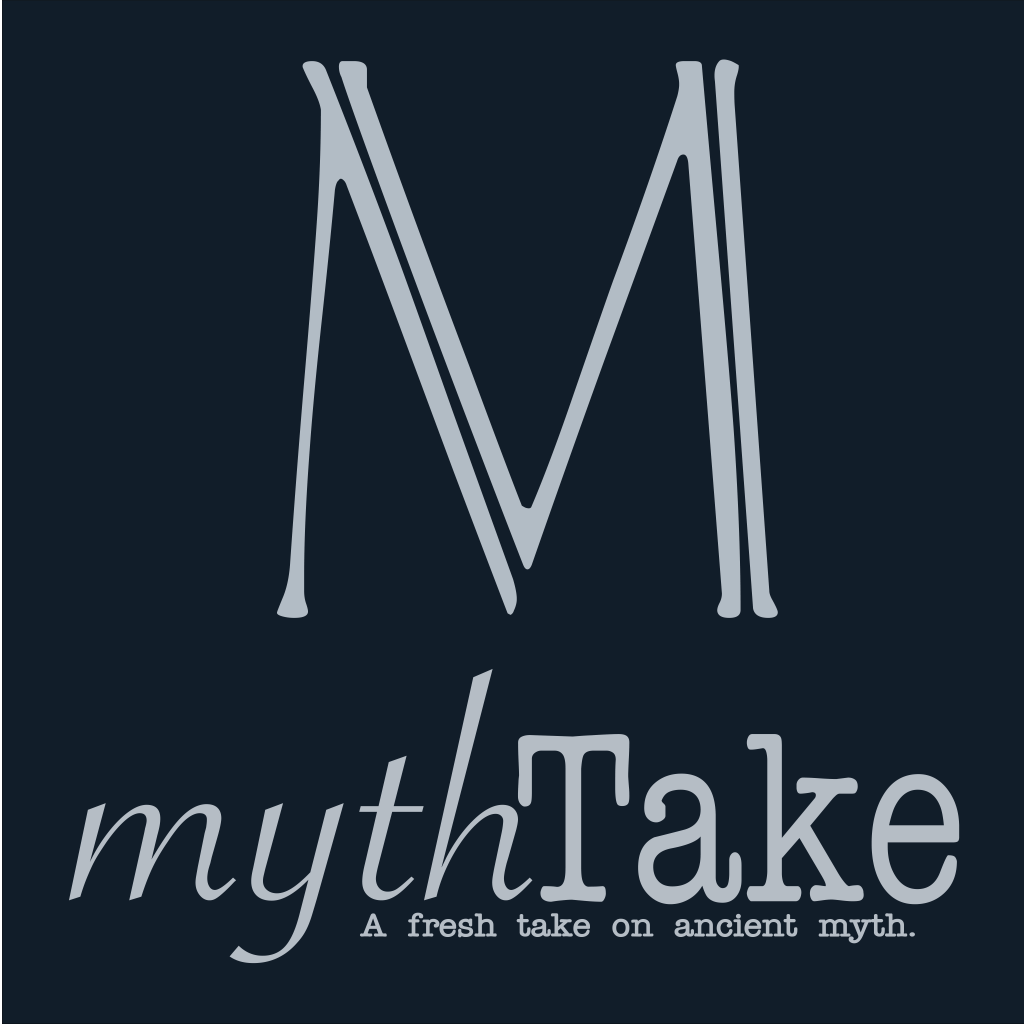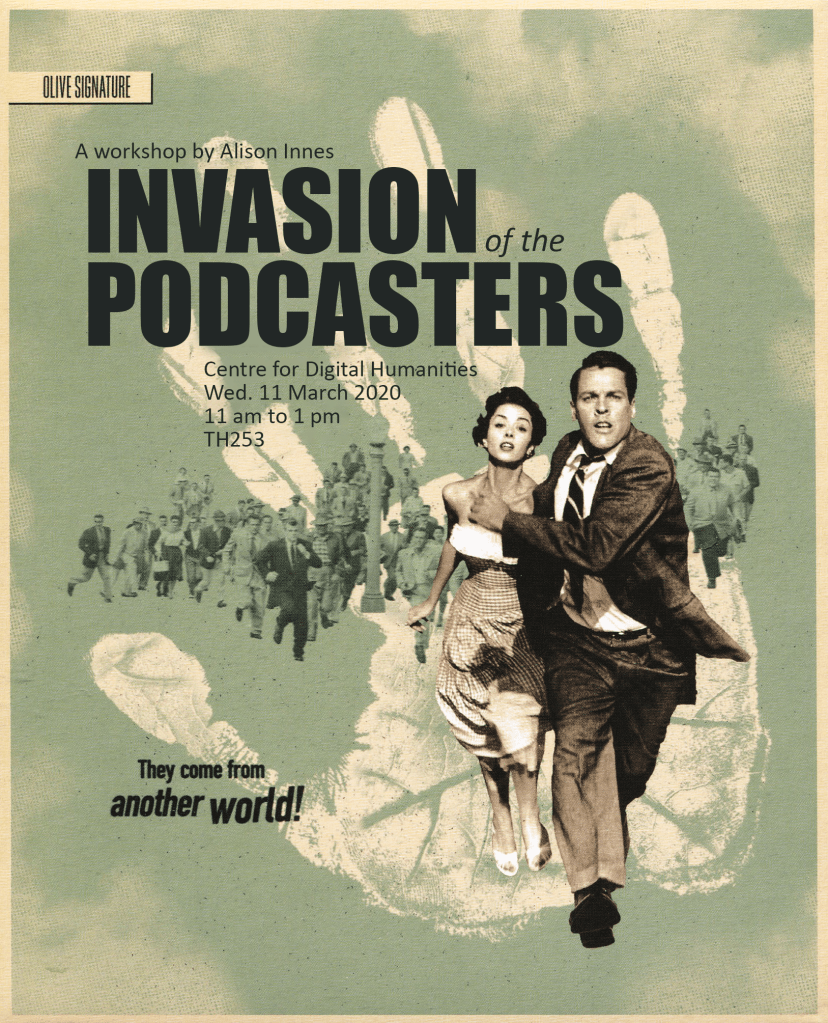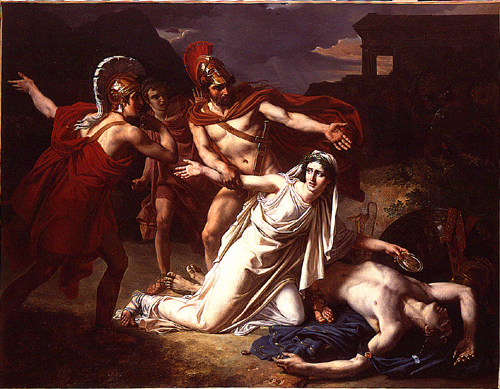Share your love of MythTake with some podcast merch! We now have t-shirts, stickers, magnets and more available on our TeePublic site.


Share your love of MythTake with some podcast merch! We now have t-shirts, stickers, magnets and more available on our TeePublic site.

Hello friends,
We’re moving our podcast feed from Podbean to Acast. You won’t notice a thing– all of our existing episodes will remain available through your favourite podcast listening app.
Happy listening!
Alison & Darrin
We at MythTake are deeply saddened to learn of the harm done to women by fellow podcaster Ryan Stitt. We are deeply sorry if our past collaborations with and support of The History of Ancient Greece (THOAG) have led to women being harmed. There is no room for harassment in Classics or podcasting.
We have removed the crossover episode we released with THOAG from our feed and blog. We look forward to seeing new and diverse voices grow in our community and to helping elevate those voices where we can.
Scholars who have lost their platform are encouraged to reach out to the many independent Classics and History podcasts available. You can find some of those podcasts here, as well as links to other ongoing lists.
Welcome to a special episode of MythTake! Rather than bring you our usual format of myth analysis, we’re doing something a little different. We’re giving this episode over to talk about race in classics.
The Black Lives Matter movement has been gaining renewed momentum, and hashtags like #shutdownacademia and #blackintheivory are highlighting the experiences of Black people in academia. Classics itself is a predominately white whose area of research is co-opted for white supremacist causes. To push back against this, and to help elevate Black voices in Classics, we put out a Twitter call for Black classicists to use our platform to share their stories. Today, we’re pleased to bring you this interview with John Bracey.
John Bracey, aka @magisterbracey on Twitter, is a Latin teacher in Massachusetts teaching Latin using the Comprehensible Input technique.. He has an MA in Classics from Boston College and in 2016 he was named Latin Teacher of the Year by the Massachusetts Foreign Language Association. He leads workshops for teachers around the US on language teaching.
He has written in Eidolon about his experience trying to get hired as a Black Latin teacher and why students of color don’t take Latin.
Find John online at https://magisterbracey.com.
This episode is kindly sponsored by Our Voices in Classics, a not-for-profit organization that proactively seeks to amplify and uplift the voices of students and scholars at all levels whom the field of Classics has traditionally marginalized, ignored, or silenced.
Find our growing collection of links to resources on talking about race and on race and racism in academia on Wakelet.
We want to hear from you!
Join us on Twitter @InnesAlison and @darrinsunstrum or @MythtakePodcast.
Give us a like, let us know what you think, and follow along on Facebook at MythTake.
Subscribe on iTunes or Google Play so you don’t miss an episode! Find our RSS on Podbean.
We’re a part of the #HumanitiesPodcasts podcasting community. Check out the hashtag and follow @HumCommCasters to find many more engaging and knowledgeable podcasts.
This week’s theme music: “Super Hero” by King Louie’s Missing Monuments from the album “Live at WFMU” (2011). Used under Creative Commons license and available from Free Music Archive.

May 18, 2020
We’re baaack! We’ve been hearing a lot about heroes in the news lately and it’s got us thinking. The word’s being used to describe doctors, nurses, paramedics, delivery people, truck drivers, and grocery store workers– all the people who are keeping our society going through the COVID-19 pandemic. But what do we really mean when we call someone a hero? Do our heroes today resemble the heroes of myth? Or are we using the label “hero” to escape societal responsibilities?
Join Darrin and Alison for this special pandemic issue of MythTake. Guest appearance by our new feline production manager!
Mattel Commemorates the Heroes of the Pandemic With New Line of Action Figures (Adweek)
America’s Heroism Trap (Slate)
Healthcare Workers Deserve More than Hero Memes (Passage)
I’m An NHS Doctor. I Don’t Want To Be A Hero – I Want To Do My Job Without The Risks (Huffington Post)
Calling Healthcare Workers “Heroes” Sets Them Up to be Sacrificed (GQ)
‘Hero’ Rings Hollow (LA Times)
We want to hear from you!
Join us on Twitter @InnesAlison and @darrinsunstrum or @MythtakePodcast.
Give us a like, let us know what you think, and follow along on Facebook at MythTake.
Subscribe on iTunes or Google Play so you don’t miss an episode! Find our RSS on Podbean.
We’re a part of the #HumanitiesPodcasts podcasting community. Check out the hashtag and follow @HumCommCasters to find many more engaging and knowledgeable podcasts.
This week’s theme music: “Super Hero” by King Louie’s Missing Monuments from the album “Live at WFMU” (2011). Used under Creative Commons license and available from Free Music Archive.

Once a fringe medium, podcasting has slowly and steadily grown to become mainstream. While big network names like I Heart Radio and Radiotopia are increasingly familiar to podcast listeners, there’s still room for the indie podcaster. Podcasts are in vogue and the listenership is growing; Apple has over half a million active podcasts in their listings as of 2020 and according to Nielson, over 16 million people in the US alone are podcast fans.
Podcasting offers a personal connection to your audience in a way that traditional radio or print doesn’t. The format is adaptable. They’re easy to create with a little know-how and topics can be as niche or broad as you wish. But with an overwhelming 30 million podcast episodes floating in the ether, how do you make your voice heard?
Join Alison Innes, Social Media Coordinator for the Faculty of Humanities and independent podcaster for a “Podcasting 101” workshop. Alison will share her experience co-creating MythTake and talk about the challenges and opportunities of independent podcasting. Learn more about the podcasting landscape and get a sneak peek behind the scenes of her latest podcasting project for the Faculty of Humanities.
Is podcasting right for you? Come and find out!

This episode we head to the movies and apply our mythological skills to the recent release Aquaman (starring Jason Momoa and Amber Heard and Directed by James Wan). Spoiler alerts!
These people like our show so much, they decided to support us on Patreon! Thank you so much!
Aven McMaster & Mark Sundaram (Alliterative); Joelle Barfoot; Erika Dilworth; Stargate Pioneer (Better Podcasting); Dan Lizotte; and Greg Beu.
We want to hear from you!
Join us on Twitter @InnesAlison and @darrinsunstrum or #MythTake.
Give us a like, let us know what you think, and follow along on Facebook at MythTake.
Subscribe on iTunes or Google Play so you don’t miss an episode! Find our RSS on Podbean.
Like what you hear? Please support us on Patreon.
We’re a part of the #HumanitiesPodcasts podcasting community. Check out the hashtag and follow @HumCommCasters to find many more engaging and knowledgeable podcasts.
This week’s theme music: “Super Hero” by King Louie’s Missing Monuments from the album “Live at WFMU” (2011). Used under Creative Commons license. Music used under Creative Commons license and available from Free Music Archive.
Episode 29 “From the Vault: Crossover” is no longer available.

This episode is all about Antigone. We discuss a recent local production of Antigone that explores the current cultural significance of the play and chat about a variety of themes. We also have a special free give away for our listeners!
https://www.podbean.com/media/player/6pcj7-a160b4?from=yiiadmin&download=1&version=1
Antigone, Adapted and Directed by Mike Griffin
Literature & History Episode 32 Antigone
History of Ancient Greece Episode 51 Sophocles
Download a PDF copy of our special edition zine! Written by Alison and drawn by Darrin, this one-page synopsis of Antigone is free to download and print.
Instructions on folding a zine on YouTube.
What is zine? It’s a magazine with a twist! Read more at AGO Art Matters.
These people like our show so much, they decided to support us on Patreon! Thank you so much!
Aven McMaster & Mark Sundaram (Alliterative); Joelle Barfoot; Erika Dilworth; Stargate Pioneer (Better Podcasting); Greg Beu; Jeff Wright (Trojan War Podcast); and Dan Lizote.
We want to hear from you!
Join us on Twitter @InnesAlison and @darrinsunstrum or @MythtakePodcast.
Give us a like, let us know what you think, and follow along on Facebook at MythTake.
Subscribe on iTunes or Google Play so you don’t miss an episode! Find our RSS on Podbean.
Like what you hear? Please support us on Patreon.
We’re a part of the #HumanitiesPodcasts podcasting community. Check out the hashtag and follow @HumCommCasters to find many more engaging and knowledgeable podcasts.
This week’s theme music: “Super Hero” by King Louie’s Missing Monuments from the album “Live at WFMU” (2011). Used under Creative Commons license. Music used under Creative Commons license and available from Free Music Archive.

“When a man cannot choose, he ceases to be a man.” Stanley Kubrick
A central tenet of Greek Tragedy is the controversial idea that there are no innocent bystanders. That the community is simultaneously a strength but also a weakness. There are foundations of law, justice and tradition, but the actions of men can at times jeopardize not only themselves but those around them.
Though we witness the actions and hear the words of individuals, the ancient Greeks understood that these ‘actors’ are in part stand-ins (proxies) for the community at large. Their decisions – for right or wrong – will effect us all. The moment of decision, that leads to a course of action is the moment when the protagonist (or another) moves into jeopardy. A moment when uncertain consequences begin to spin outward, problematizing and pulling individual choices outside the traditional recognized norms (nomos) of the polis (for us here the ‘community’).
The heroes efforts to alter, twist, bend and or control fate/destiny or override the ‘unwritten laws’ of the gods is one that is not often well received by either the Chorus of a tragedy – or it’s audience. For in the day-to-day world of the traditional polis there is a harmony or ‘interweaving’ between state and ritual to the point that they are recognized by classical historians as one in the same. Any alterations in this unity would immediately be recognized by all in attendance.
The tension and force that is created by the singular hero of a play can warp the very fabric of the polis and move us all into this shared ‘danger-zone’. A dissonant landscape that is activated when human illusion and divine decree come into conflict.
No man (or hero) can step beyond, into or outside this space and hope to remain unchanged. Nor can those around them who now find their community jeopardized (or at least under divine scrutiny) seek the same assurance. It is this this movement of the individual, this ‘heresy’ (choice) that ultimately generates the often referenced Aristotelean end product of ‘catharsis’ evidenced in the collective.
The ‘heroic decision’ is not one to be taken lightly – they are not without import and even though they may be underwritten by a sacred Oath, there is no guarantee that they will bring harmony or peace to human affairs. In every case as the thoughts form the words of these characters and publicize their decisions, we are made to witness the ‘hamartia’ (error) that so often plagues our tragic heroes. They present to us the uncurbed pride of human will and the folly of a hubris that lies in wait to destroy a man – or a community – who opposes a divine decree.
All is not lost however, the hero may endure as might the community should the proper steps be taken. But rest assured things will not be the same. Death, destruction, and madness are often the end products of this disturbed world-order struggling to regain its equilibrium in an environment of fear and pity.